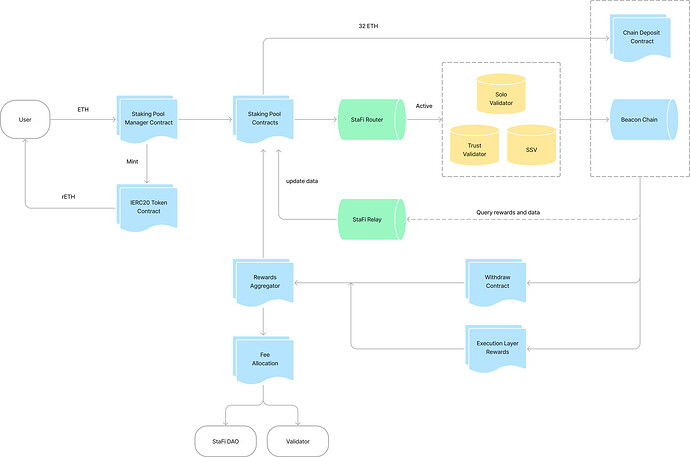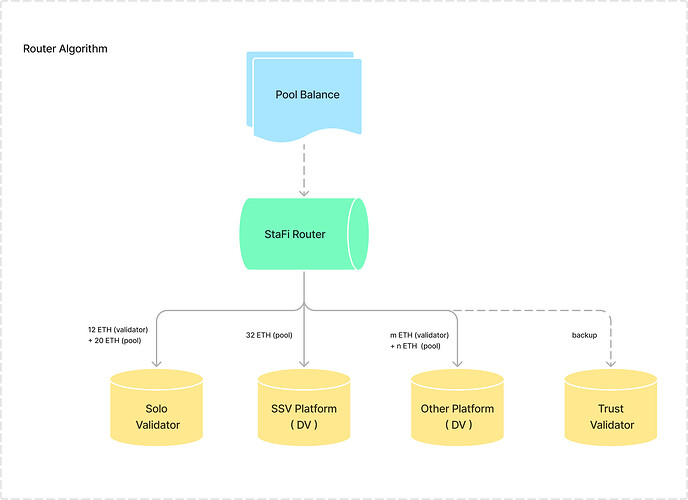Abstract
DVT (Distributed Validator Technology), by allowing validators to run on multiple nodes or machines, has the potential to significantly enhance the decentralization and security of Ethereum. In light of this, StaFi has decided to integrate DVT into its ETH liquid staking service via a new module called StaFi Router, which will enable us to implement this technology and further enhance the security and decentralization of the Ethereum network.
Motivation
DVT is a technology primitive that enables an Ethereum PoS Validator to run on multiple nodes or machines, allowing an individual, group, or community of operators to operate a cluster of nodes as a single validator on Ethereum.
The current StaFi ETH liquid staking validator function supports trust validators and solo validators. To support DVT and accommodate future expansion of validator types, we have developed a new module called Router. Router will integrate existing validator services with upcoming SSV support and use its allocation algorithm to assign user staked ETH to the corresponding validator.
Specification
Overview
General module
- Staking Pool Manager Contract:Handling user operations such as staking, unstaking, or withdrawing.
- IERC20 Token Contract: rETH token contract on Ethereum.
- Staking Pool Contracts: Implementation of the core functions of the staking pool.
- Ethereum Deposit Contract: Ethereum staking deposit contract
- StaFi Router: A router used for validator selection, activation and management.
- StaFi Relay: Off Chain: Data synchronization and scheduled trigger to update era .
Router Algorithm
The Router will monitor the events and balance of the staking pool. The pool will set aside a specific amount of ETH for withdrawals. If the pool’s valid balance exceeds 20 ETH, users can choose to deposit 12 ETH as a solo validator and use their own server or SSV to activate the validator on the Beacon Chain. This activation process needs to be done manually. Once the pool’s valid balance exceeds 32 ETH, the Router will automatically generate a validator key, register a validator with SSV, and activate the validator on the Beacon Chain.
To increase decentralization, we plan to decrease the number of trust validators and use them only as a backup.
SSV integration
StaFi Router integrates with SSV using its API and SDK.
sequenceDiagram
StaFi contracts-->>StaFi Router: 32ETH
StaFi Router->>StaFi Router: generate validator key
StaFi Router->>StaFi Router: init validator info
StaFi Router->>SSV:select 4 operator and register validator on SSV
SSV->>SSV:encyped validator key
StaFi Router->>SSV:active validator on SSV
SSV->>Beacon(Ethereum):validator
StaFi contracts-->>Deposit Contract(Ethereum):32ETH
StaFi Router->>SSV:set fee recipient address and pay fee
Beacon(Ethereum)-->>StaFi contracts:rewards
- Struct
Task: A structure containing all relevant information about the SSV integration.
type Task struct {
stop chan struct{}
eth1StartHeight uint64
eth1Endpoint string
eth2Endpoint string
superNodeKeyPair *secp256k1.Keypair
ssvKeyPair *secp256k1.Keypair
gasLimit *big.Int
maxGasPrice *big.Int
poolReservedBalance *big.Int
seed []byte
postUptimeUrl string
isViewMode bool
targetOperatorIds []uint64
storageContractAddress common.Address
ssvNetworkContractAddress common.Address
ssvNetworkViewsContractAddress common.Address
ssvTokenContractAddress common.Address
// --- need init on start
dev bool
ssvApiNetwork string
chain constants.Chain
connectionOfSuperNodeAccount *connection.Connection
connectionOfSsvAccount *connection.Connection
eth1WithdrawalAdress common.Address
feeRecipientAddressOnStafi common.Address
latestRegistrationNonce uint64
eth1Client *ethclient.Client
eth2Config beacon.Eth2Config
superNodeContract *super_node.SuperNode
userDepositContract *user_deposit.UserDeposit
ssvNetworkContract *ssv_network.SsvNetwork
ssvNetworkViewsContract *ssv_network_views.SsvNetworkViews
ssvTokenContract *erc20.Erc20
withdrawContract *withdraw.Withdraw
ssvNetworkAbi abi.ABI
nextKeyIndex int
dealedEth1Block uint64 // for offchain state
validatorsPerOperatorLimit uint64
validatorsByKeyIndex map[int]*Validator // key index => validator, cache all validators(pending/active/exist) by keyIndex
validatorsByPubkey map[string]*Validator // pubkey => validator, cache all validators(pending/active/exist) by pubkey
validatorsByValIndex map[uint64]*Validator // val index => validator
validatorsByValIndexMutex sync.RWMutex
// ssv offchain state
clusters map[string]*Cluster // cluster key => cluster
feeRecipientAddressOnSsv common.Address
handlers []func() error
handlersName []string
}
- Struct
Validator: A structure containing all relevant information about the SSV validator.
type Validator struct {
privateKey *bls.PrivateKey
keyIndex int
status uint8
registedOnSSV bool
removedOnSSV bool
}
- Struct
Cluster: A structure containing all relevant information about the SSV cluster.
type Cluster struct {
operators []*keyshare.Operator
operatorIds []uint64
latestCluster *ssv_network.ISSVNetworkCoreCluster
balance decimal.Decimal
managingValidators map[int]struct{} // key index
latestUpdateClusterBlockNumber uint64
latestValidatorAddedBlockNumber uint64
latestValidatorRemovedBlockNumber uint64
hasTargetOperators bool
}
- function
checkAndOnboardOnSSV: select operators and register validator to SSV. - function
checkAndDeposit: generate validate key, check the pool balance and init validator. - function
checkAndStake: active validator on SSV. - function
updateOperatorStatus: check and update the status of the selection operators. - function
checkAndSetFeeRecipient: set fee recipient address. - function
checkAndOffboardOnSSV: validator on SSV exit. - function
updateSsvOffchainState: Syncing data and receiving events. - function
updateCluster: check and update the meta of the cluster. - function
checkAndReactiveOnSSV: reactive the cluster on SSV
Distribute Validator Key Generate
As the development of SSV’s DKG is currently in progress, the process of generating Validator Keys requires careful consideration of performance and security to ensure a high level of decentralization.
In the long term, once SSV’s DKG is completed, we will replace the current scheme with SSV’s DKG to further enhance security and decentralization.
Smart operator selection
SSV operators are evaluated based on various metrics such as price, status, and performance, as well as dynamic operations such as updated fees and off-boarding. To ensure optimal operator selection, the StaFi Router will periodically search for operator information on the SSV network at certain frequencies.
SSV related api:
-
/api/v4/{network}/operators: SSV operator list -
/api/v4/{network}/operators/operator: SSV operator detail
Security Considerations
StaFi Router operates as an off-chain service, there is a possibility of server failures that can result in delayed rewards and prevent the ability to run new validators in SSV. In addition, there is a risk of being targeted by attackers, which could lead to validators being slashed.
Copyright
Copyright and related rights waived via CC0 .

